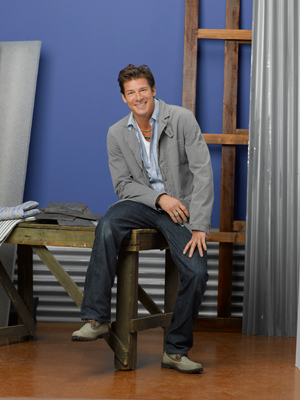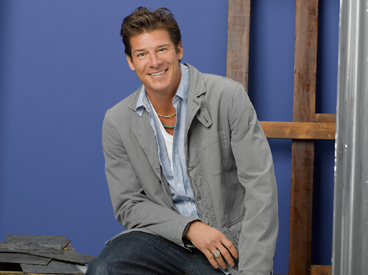The stories of people living with ADHD are as unique as the people themselves. As author Sharon Begley writes in “If It’s Boring, I’m Done!” (Nov/Dec 2012), people with ADHD who finally receive accurate diagnosis and treatment share one thing in common: a sense that what was once shrouded in mystery is now lit with understanding, that a weight has been lifted, and a puzzle solved.
The Post profiles several well-known individuals—Ty Pennington, Shane Victorino, Karina Smirnoff, and Andrés Torres—who share their struggles and triumphs in coping with ADHD, a condition that afflicts millions of American adults, largely underdiagnosed.
But as these celebrities clearly demonstrate, once diagnosed and treated, adults with ADHD can truly thrive.

Ty Pennington
America knows Ty as the hyper-energetic man on the megaphone, juggling 18 projects simultaneously to transform homes for deserving families on the former TV program Extreme Makeover: Home Edition. More recently, the same energy surfaced on the daytime show The Revolution. Today, Ty is busy working on a home décor and fabric line.
But the 47-year-old is equally enthusiastic and candid when talking about success in coping with his lifelong battle with ADHD.
“I was diagnosed before they really knew what to call it,” says Ty. “My mom was studying to be a child psychologist. I was lucky because she went to my elementary school to evaluate kids and study the ‘worst’ ones. Everybody was saying that ‘I don’t think you really want to know who that one is.’ Watching through the classroom window, she saw me distract everyone—from hitting Johnny in the back of the head to climbing out the window. I was a constant distraction. It seems comical when you are young. I was an out-of-control kid.”
Ty’s mother tried several different interventions but none worked, and she worried as she watched her young son struggle academically and emotionally.
“The telling thing about ADHD as a kid is that feeling you get when people are saying that there is something wrong with you,” the TV host says. “It’s tough to communicate why (you) are doing something in school and why you are not digesting studies as much as other kids are. However in some categories, you excel. For example, in geometry where graphic shapes are at play I stood out. Today, I promote the arts because it offers kids who might not be academically inclined a chance to find what they are good at. While I was the odd man out, I could focus on my projects until I was pretty well known, then I turned back into Mr. Excitement.”
As with many individuals now and especially then, Ty remained undiagnosed until his late teens.
“It wasn’t until I was out of high school and in my first year of college that my art instructor asked to get in touch with my mom. I was making drawings that were a little dark,” he recalls. “During the early days, doctors put me on antihistamines to calm me down.”
The antihistamines made him drowsy. But nothing seemed to really work. Fortunately, Ty discovered another outlet for his boundless energy—sports.
“I have always been the Energizer Bunny, way before I was medicated,” Ty says. “Sports, for many, is an area where you can gain confidence. You are not going to gain confidence from bringing home a book report with a B on it. With sports, you can define yourself as a certain player in a certain sport. With some kids, it is the only arena where they can find their confidence, as part of a team. Any time you can take a kid and get them out of the isolated ‘odd kid out’ mentality and make them part of something, that’s good.”
At 17, he was finally diagnosed with ADHD and offered effective treatment to manage his symptoms. The diagnosis was literally a true game changer.
“I played soccer my entire life beginning at age 8 and was good,” he admits. “But when finally diagnosed and medicated, I played like I never could. Finally, I could read the field, thinking ahead of the play before I got there. I had no idea how.”
Off the field, he began to notice other changes as well helping him focus and achieve goals that he never thought possible.
“ADHD affects your communication skills as well as your confidence. I no longer spoke in fragments for one thing,” he says. “People began to see a change in me, on the soccer field and in academics as well. Reading has always been a challenge. You get lost after several paragraphs. You realize that your eyes are still reading but you are not soaking in the information. I have always been very visual, so I would draw pictures for a history class so that looking at the picture would help me visualize the information I was reading.”
It was in the visual arts where Ty discovered a place to focus his considerable energy and talents.
“ADHD affects so many aspects of life, including your confidence level,” Ty says. “You have to believe in yourself. When people are challenged with ADD, especially ADHD, they really have to find an outlet where they can shine. For me, that was in art. I put myself through art school and people began praising me for the talent. I had not had that experience before—people praising me for something.”
A familiar face to almost everyone in America, Ty now meets many families who face a situation all to familiar to the artist.
“Families see that I can complete a task, which is a big accomplishment,” explains Ty. “And some of those tasks have been pretty monumental. I can lead a team and build a house in less than four days while keeping my fingers and digits at the same time. ADD and working with power tools is not the smartest choice.”
The challenges of ADHD overshadow personal relationships as well, but medication can help.
“ADHD affects your family life and any relationships because communication is the biggest drawback to ADD,” he says. “Because you can’t get out what you want to say. Sometimes another medium like writing or art can help, you can communicate better. One of the reasons you can get into trouble in relationships is the belief that you are not as good as someone else; you cannot live up to their expectations. Everyone would love not to be on medication, but people do not realize that (it) is so easy to go off your routine. But medication provides an extra helping hand to keep you on your routine.”
Become a Saturday Evening Post member and enjoy unlimited access. Subscribe now




Comments
THANK YOU for this well written article for an ADHD audience! 🙂
Loads of great points here. As an adult with ADHD, I know that I’m capable of accomplishing remarkable things if I can just get out of my own way! Not everyone is tolerant, understanding and patient — nor do I expect them to be. I’ve just come to terms with that and with the appreciation of how unique I am. It takes time to see the positive differences we possess because we’ve been told our whole lives about the annoyingly obvious ones.
But please, if you have ADHD and you’re reading this, don’t give up on yourself. Keep trying. I know that you are working on being the best you can every day. Start by recognizing just one good thing you do differently because you have ADHD. For me, it’s determination – especially when trying to figure something out that seems unsolvable. When others give up, I want to soldier on until we’ve found a solution. I work with my ADHD to explore many different solutions until finding the solution.
Those of us with ADHD have a big responsibility to show the world that we are more that what our disorder tries to hide with disorganization, tardiness and rambling apparently nonsensical comments. We can do that by facing each day head on, knowing that we have something remarkable to share with the world. Don’t let anyone make you believe anything different.
Great questions, Ann, and glad you enjoyed the article!
Here are some online resources we’ve found that may help you and your son in dealing with Adult ADHD:
CHADD.org is a great place to start your research. At Adults with ADHD: Steps for Beginners you can learn the basics of ADHD and take a self-evaluation. The page also links to helpful suggestions on how to find a medical professional.
Helpguide.org’s Help for Adult ADD/ADHD page offers plenty of self-help tips, such as staying focused, managing time, and more. Shane Victorino’s Own It project’s resource page, provides lots of helpful links, including the National Resource Center on ADHD.
—
Jesika St Clair | Associate Editor
The Saturday Evening Post
I read the article, If it’s boring I’m done. It is my 50 year old son. This is him to a tee. He is very smart, everyday jobs, he can’t stay focused. Now the horse racing, he loves, as it lights his fire. This can be a big problem. Who should he see for this. Mental Health, Primary Care, or who? He is so smart, he outsmarts himself. I am amazed by this article. Ann Grigway